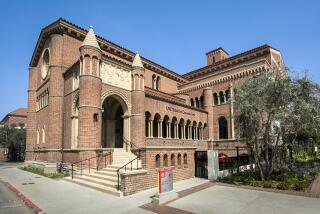Funds Proposed for Pacific Studies School at UCSD
- Share via
Gov. George Deukmejian’s 1987-88 budget contains a $7.8-million proposal to build the University of California’s first new professional school in 20 years, the Graduate School of International Relations and Pacific Studies at UC San Diego.
It is to be the first U.S. graduate school to focus exclusively on the Pacific Ocean nations that are increasingly important to California’s economy.
“The school will provide professional training for careers in the Pacific Basin in industry, government and international organizations” and will “carry out research on economic, political, social, cultural, technological and security issues confronting nations in the Pacific Basin,” the governor said in his budget message.
The budget had less good news for UCSD undergraduates, whose fees would rise about $130 next year. Graduate students’ fees would also increase about $70. The average annual fee bill for all students would be about $1,375 beginning next fall if Deukmejian’s proposals are adopted. Non-resident tuition would also increase from $4,086 to $4,290, plus fees.
Deukmejian’s funding announcement came a day after he announced initiatives aimed at expanding Pacific Rim markets for California products during his State of the State message.
“Traditionally, international relations meant looking toward Europe, where so much of our history has been involved,” said Richard Attiyeh, dean of graduate studies and research at UCSD. “Obviously, everyone is aware of the emerging Pacific Basin area as equal in importance to the Atlantic.
“We see this school as not just a UCSD school, but as a school . . . servicing the interests of the state as a whole.”
On the West Coast, only the University of Southern California and the University of Washington have international relations schools, neither of which focuses on the Pacific Rim. Yet 82% of California’s $80-billion annual foreign trade is with Pacific Rim countries, which provide almost 85% of the state’s imports and take 78% of its exports.
The countries include those on the west coast of South America as well as Central America, Mexico, the United States, Canada, the Soviet Union, Japan, both Koreas, China, Taiwan, Southeast Asia, the Philippines, Australia and New Zealand.
Scheduled to open in September with an enrollment of 48 master’s degree students, the school will grow to an ultimate enrollment of 400 by 1991. In 1989, it is scheduled to move into a new 41,000-square-foot building funded by the budget allocation.
Its founders envision an institution with a heavy economics and commerce orientation that will turn out business executives, government and foundation experts, academics and journalists familiar with the nations ringing the Pacific.
When the school is fully developed, 250 students will be working toward master’s degrees, 130 will be in an advanced career training program and 20 will be enrolled in a doctoral program.
Businesses will send their employees for training in how to work “in an environment that is not just an English-speaking environment, (in) knowing the culture and the ways, the subtleties, of a different culture,” Attiyeh said.
But the school is also envisioned as a community resource with a library and lecture programs open to the public, he said.
Four faculty members have been hired, and UCSD Prof. Peter Gourevitch, who headed the drive to locate the school here, has been named dean. More than 150 students have applied for admission to the first class.
Overall, Deukmejian’s budget proposal contains more than $18 million in capital projects for UCSD, $5 million of which is from the Higher Education Facilities Bond Act passed by voters in November. The budget includes:
- More than $5 million for several modernization projects at the UCSD Medical Center and for planning the expansion of the inpatient service areas.
- More than $3.9 million in bond funds to equip a new engineering building.
- Bond funding of $880,000 to plan a major addition to the Central University Library.
Times staff writer Jeffrey Perlman contributed to this story from Sacramento.
More to Read
Sign up for Essential California
The most important California stories and recommendations in your inbox every morning.
You may occasionally receive promotional content from the Los Angeles Times.










